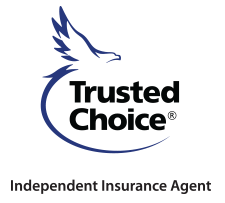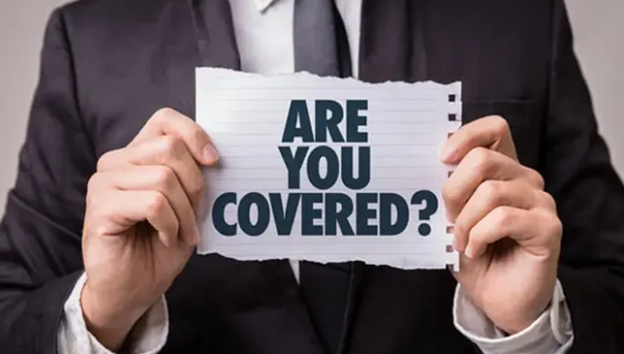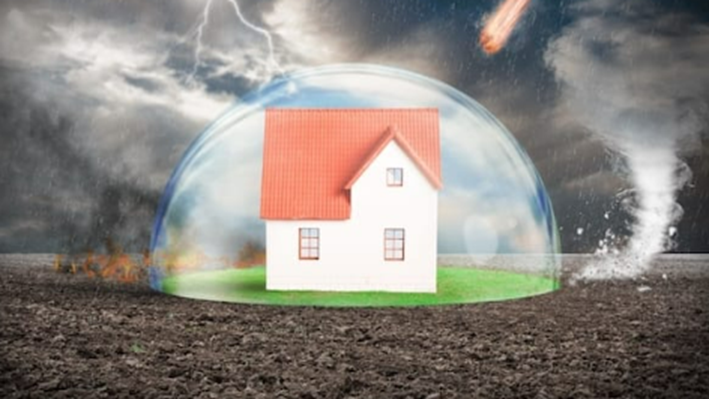
Call Us At:
Si Habla Espanol | We Speak Mandarin 中文
Newark & Wilmington Locations |
lisa@broadbentins.com
Affordable Insurance for what Matters Most to You
Blog
Affordable Insurance for what Matters Most to You
Affordable Insurance for what Matters Most to You

By Lisa Broadbent
•
04 Apr, 2024
It’s spring-cleaning time, and most of us are probably making a list of the essential maintenance tasks that we are eager to undertake in the next few weeks and months. What better time to think about a few things that you can do to make your home safer and more secure as you work to spruce it up? No matter how safe your neighborhood, your home is not immune to damage risks. It’s also not immune to the potential for a thief to break in, and if they do, they could damage the property and steal your belongings. It’s at this time that your homeowners insurance can come in handy. Still, it’s best to minimize theft risks as best you can. Safety Tips for Your Home’s Security The spring is a great time to make home security improvements. As you make security changes, the less vulnerable your home will be. As a result, your risk to your home insurer could drop. Here’s what to do: Consider installing a home security system . Some systems are very comprehensive, and might include doorbell cameras, alarms, internet connectivity and automatic lines to the police. Other systems are simpler, but can provide great protection for the home. Some systems don’t even require experts to install; you can set them up on your own time. Inspect your home’s locks . If you find that locks are weak or have corrosion, then replace them. A broken lock is as good as an open door. Lock technology has advanced considerably in the last few years, and when upgrading locks, you might be able to install keypads, internet-controlled or smart-phone-enabled locks. Increase security around your windows, crawl spaces or basements. Change the locks as needed. Add screens, jammers and other items to limit someone’s ability to open these items. Place automatic lighting around the home. Use timers on certain interior lights, which can come on when no one is at home. This can give the impression to potential predators that someone is home even when they aren’t. Also use motion-sensor lighting outside the home. They can illuminate when something passes them, and alert you to a prowler outside. Keep the home’s exterior in good shape. Upkeep shows that someone lives there, cares about the property and takes security seriously. Thieves might be less likely to break in if they believe someone is home. Get to know your neighbors. If you live near people you trust, they can keep an eye on the property and alert you to potential dangers. Of course, don’t forget to invest in a quality homeowners insurance policy. These policies can help owners repair damage and replace lost property following break-ins. Both dwelling coverage and possessions insurance can be instrumental in helping you when unfortunate break-ins occur. Contact an agent at Broadbent Insurance (302) 731-0044 today to discuss your homeowners insurance options and allow us to make sure your home and property are safe.

By Lisa Broadbent
•
04 Mar, 2024
High risk drivers are likely to pay more for their auto insurance because they are more likely to cost the insurer a lot of money. Insurers calculate your risk rating based on how likely you are to file a claim and how much that claim is likely to cost them. Your risk level is based on a variety of factors, and the higher risk you pose, the higher premiums you may pay. After all, the riskier and more expensive you are to insure, the more your insurer is likely to charge you. If you ever get a ticket, have an at-fault accident or increase your car insurance policy’s limits, then you should not be shocked to see your car insurance premiums go up. However, there are a lot of other reasons that your auto insurer might increase your premiums. Some of them might surprise you. Let’s take a closer look at some of the more surprising reasons that your car insurance premium might rise, and what you can do to help stabilize your rates. You Are Getting Older Age is a factor that can influence car insurance rates. One of the most obvious examples of this phenomenon is when a teen driver pays a much higher premium for their car insurance than their sibling who is in their 20’s. A teen driver has very little experience behind the wheel compared to seasoned drivers. Therefore, they are much more likely to have a wreck. However, old age is also a factor that could drive up your rates. Even though you have a lot of experience driving, you might no longer be as spry as you once were. Reflexes, eyesight and reaction time all help you drive safely. As you get older and these faculties slow down a bit, your risk of a wreck might go up. Therefore, this factor might drive your rates. You Move to a Busier Area In some communities the risks of car wrecks, vehicle theft or other losses are very high. For example, if you move from a small town to a large city, then there is a lot more traffic on the road around you. There are also higher risks of vehicle theft and other property crimes. As a result, you have a higher risk of having to file a claim on your policy. Therefore, you might have to pay more for your plan. You are Single Some studies suggest that married people are better drivers than single individuals. Therefore, some insurance companies will charge a single driver more than a married one (all else being equal). Plus, single drivers who only need to insure one car often do not qualify for multi-car insurance policies. Comparatively speaking, families might save money through a multi-vehicle plan option as opposed to insuring all the drivers and cars in their households under separate plans. Still, not all insurers will charge you more just because you are single. You are a Loyal Customer If you have stayed with the same insurance company for numerous years, then you might pay a higher rate than someone who just joined that company. This surprises many drivers, since a lot of insurance companies reward discounts to those who have stayed loyal to them over the years. However, some insurers offer lower rates to customers who have a history of changing companies frequently. They might do so to maintain those clients’ business and remain competitive in the market. Some consumer protection groups even have found that certain insurers will take the risk of raising a loyal customer’s rates because they know that person is likely going to remain a customer. You Have a Lower Level of Education If you have not finished college, then you might pay more for your car insurance. While it is hard to determine exactly what causes these higher rates, one reason might be financial. Those without college degrees tend to make less money than those with more professional training. As a result, they might not have the financial reserves available to pay for the costs of accidents out of pocket. Therefore, they might be more likely to file a claim against their car insurance for a vehicle loss. A higher reliance on car insurance claims, therefore, could drive up someone’s rates. This is particularly true because insurers often look at someone’s history of filing claims when developing quotes. If they see that you have made a lot of claims in the past, then they might guess that you have a higher risk of filing another one in the future. Therefore, you might have to pay more. What’s important to remember, however, is that no single factor is going to be a make-or-break deal in increasing or decreasing your car insurance premiums. Instead, the combination of numerous factors will play the deciding role. The best thing to do to ensure that you get affordable rates is to talk to an independent insurance agent. They can help you compare the policy offerings of numerous carriers to find the plan that offers you the best affordability. Contact an agent at Broadbent Insurance (302) 731-0044 today to discuss your auto insurance options and allow us to give you an estimate on the coverage that is best for you and your family.

By Lisa Broadbent
•
08 Feb, 2024
Being an entrepreneur is no piece of cake. You are going out on your own, venturing into a new industry and the future is unknown. Many factors will contribute to whether your new business will be a success or not. One of those factors is whether you purchase comprehensive business insurance from the get-go. Below, we will discuss what types of business insurance you should consider as an entrepreneur who is starting your own company.

By Lisa Broadbent
•
03 Jan, 2024
With age comes wisdom, and probably a lot of the financial stability that you have longed for throughout your life. Still, getting older means facing the fact that eventually the inevitable will happen. Naturally, you want to make sure that when you do pass away, that you can leave a strong financial legacy to your family. One way to ensure their continued comfort is with life insurance. Still, getting life insurance later in life, particularly at the age of 65, can come with its hurdles. Age, health and other factors might limit your ability to qualify for or enroll in coverage. Still, it is completely possible to get adequate coverage, despite the extra steps you might have to take. Age and Life Insurance Risks All insurers want to know their risk of insuring individual customers. After all, their job is to pay customers money when they file a claim. The insurer wants to gauge the likelihood of that happening. Therefore, both your eligibility for and premium on any given insurance policy is going to vary based on the risk profile the insurer develops. Usually, older people represent higher risks to insurance companies, for relatively straightforward reasons. Life insurance pays out when you die. Therefore, if you are older or have more significant health issues, then you are certainly more likely to die than someone 30 years younger. As a result, as your age increases, life insurers will begin to view you as more of a risk. At this time, they might charge you more for your coverage, and many will even decline to insure you due to your advanced age. Nevertheless, older and retired individuals can still qualify for coverage. It just might take some extra work. Finding the Right Coverage Most older individuals, especially those who are retired or past the age of 65, can still benefit from life insurance. Therefore, it is almost never too late to consider buying a policy. Older people can usually qualify for both whole- and term-life policies, though there will often be limitations on the precise coverage they can get. For example, some term-life policies have cut-off dates at age 75. A 65-year-old might therefore only qualify for a 10-year policy. Other policies might have medical exam requirements for enrollees, and an older individual with health conditions might not pass the test. Still, there are no-exam policies available. Getting the right coverage will take coordination with your insurance agent. They can discuss your coverage options, help you choose benefits, and ultimately assist you in developing a tidy policy that will leave a neat sum to the survivors you love. Call Lisa Broadbent Insurance at (302) 731-0044 to discuss your life insurance options with our team of experts today.

By Lisa Broadbent
•
01 Nov, 2023
Most people do not have the money to pay for a new house in-full at the time that they buy it. As a result, they will usually take out a mortgage or other financing to finalize the purchase. When you finance your home, you will have to repay the loan to the bank over a period of years. During this time, the bank has an investment in the property. So, if something happens to your home, then you are not the only party who might lose out financially. Your lender will also still expect to be repaid their mortgage, even if a tornado were to destroy your home. It is currently that your need for homeowners’ insurance is critical. Most mortgage lenders require property owners to purchase homeowners’ insurance. At this time, you must carry coverage that meets the lender’s expectations. Usually, they will institute a replacement cost value (RCV) dwelling coverage requirement on the property. Here is how it and its counterpart, actual cash value (ACV) coverage, work. Replacement Cost Value Coverage A RCV homeowners insurance policy insures your dwelling based on the price it will cost to rebuild, at today’s rates. Replacement cost value is not the sticker price that you paid for the dwelling and the rest of the property. Instead, it is the value of the house itself, which is different from the price of the property, even though it is the most substantial part of your property value in most cases. The benefit of RC coverage is you will be able to repair or rebuild a damaged home to exactly the way it was before the loss occurred. However, the drawback is that you will need to periodically clarify with your agent that your coverage is still adequate, given that construction and replacement costs often change. Actual Cash Value Coverage An alternative to RCV coverage is actual cash value insurance, which is both exceedingly rare and inadequate for use in dwelling insurance. If the value of your dwelling decreases over time, such as due to age, then an ACV policy will only pay based on the value of the house at the time of the loss. This is far from adequate when it comes to building an entirely new home, or to making extensive repairs. These policies are seldom offered to consumers today. Once your lender tells you what type of coverage they require, your insurance agent will be able to help you design the right benefits. RCV policies are by far the best coverage to carry, and your agent can ensure that you receive the right balance of benefits for your needs. Call Lisa Broadbent Insurance today and we can review your homeowner’s insurance options at (302) 731-0044 .

By Lisa Broadbent
•
02 Oct, 2023
In the unfortunate event that you experience property damage, here is information you may want to have filed away. Remember, it’s not only natural disasters that can cause property damage but also fires, water leaks, and human error. When an incident does occur, it’s essential that you act swiftly to ensure your safety, prevent further damage, and get your insurance claim started. With that in mind, here are some general guidelines and best practices to keep in mind: 1. Prioritize safety. Ensure the safety of yourself and others by evacuating the premises if necessary. In case of emergencies such as fire or gas leaks, contact the appropriate authorities immediately. 2. Notify us. Reach out as soon as possible to your insurance agent to discern when and if we need to start the claim process. When communicating with the carrier, document all conversations, including dates and names of insurance representatives. 3. Document damage. Take photographs or videos of the affected areas before cleanup or repairs. List all damaged/lost items, including their estimated value. 4. Prevent further loss. Take preventive measures such as placing a tarp over a leaking roof or turning off utilities. Remember, don't make permanent repairs or dispose of damaged items before consulting with us. 5. Keep receipts. Keep receipts and invoices for temporary repairs, accommodations, and supplementary costs. 6. Be proactive with contractors. Gather two to three estimates from reputable contractors. Be wary of individuals who make be taking advantage of a situation by sweeping into your neighborhood after a catastrophic event. And remember, never pay for services upfront. Once you hire contractors for cleaning, removal, or restoration, be sure to discuss what can and cannot be discarded to avoid accidental loss of valuable items. While we hope you never experience property damage, we want you to be prepared and informed if you do. And remember, you won’t face it alone – we’ll be here to support you and answer any questions you may have. Call Lisa Broadbent Insurance today at (302) 731-0044 if you have questions or need help in determining if you have the right property insurance to protect you and your family.

By Lisa Broadbent
•
05 Sep, 2023
Natural disasters happen. Although no one can predict when they will occur, homeowners’ insurance can give you peace of mind. First, however, it is essential to understand what qualifies as a natural disaster under the terms of your policy. Homeowners insurance covers a vast range of natural disasters, including those caused by fire, tornadoes, hail, explosions, windstorms, volcanoes, hurricanes, and extreme cold. That said, homeowners’ insurance does not cover some natural disasters, such as floods, earthquakes, and mudslides.

By Lisa Broadbent
•
02 Aug, 2023
The three essentials for feeling truly free on a ride: A protective helmet A solid jacket and foot protection A bulletproof motorcycle insurance policy for you and your passenger Whether you’ve got the ride of your dreams or you’re saving up for your perfect bike, there’s only one way to enhance that feeling of leaving all of your worries behind. Motorcycle Insurance: do you really need it? Owning a motorcycle can be one of the most exhilarating things in life, but according to the National Safety Council, a motorcycle accident that result in serious bodily harm happens every 6 minutes in the United States. If you think motorcycle insurance is a “wasted” expense, think again. Insurance is more about managing your risks than anything else. Without insurance, all it takes is one accident to drain your savings or your ability to pay medical expenses. Even if it is off season and your bike is just sitting in the garage you need to have coverage otherwise it will not be insured even if there is a house fire. Your homeowners, renters or condo policy excludes your bike. So make sure you keep your bike insured throughout the entire year. We are here to make sure you have the right coverage for your needs, and that means we will do our best to get you the best coverage for the most reasonable cost. What are your coverage options? There are mandatory minimums, of course, but you may wish to consider other options on your bike, which are reasonably priced extras that can give you more comprehensive coverage and better peace of mind, including: Additional liability coverage Collision Comprehensive Roadside assistance Bike accessories Total loss insurance Rental vehicle coverage Trip interruption coverage On road insurance for off road vehicles When you need the best motorcycle insurance You can trust our team when you need to decide on insurance for your bike. As an independent company, we are not tied to just one insurance company. We have several A-plus-rated insurance carriers we can shop with, to make sure you get the very best Motorcycle Insurance and the lowest premiums. Why we are different While most insurance products are similar in price and function, insurance providers vary when it comes to structuring a policy tailored to you. After all, there’s no such thing as a one-size-fits-all insurance policy when it comes to your business. Contact Broadbent Insurance Agency today and we'll help you protect what matters most. Call us at (302) 731-0044 to discuss motorcycle insurance and any other insurance need you might have.

By Lisa Broadbent
•
05 Jun, 2023
Did you know that your homeowners insurance does not cover flood damage? Insurance against flood must be obtained separately. A flood insurance policy also reimburses you for the work that you and other family members did to sandbag your homes, move furniture and remove debris. The Federal Emergency Management Agency’s (FEMA) maps are important when it comes to flood insurance because if they show that your home sits in a 100-year flood plain, you must buy federal flood insurance in order to get a mortgage. If you live outside a high-risk zone, or if you no longer have a mortgage, flood insurance is optional. Broadbent Insurance Agency offers free, comparative quotes on flood insurance from multiple insurance carriers so you can get the best possible rate. Want to see how much we can save you? Call us at (302) 731-0044 to request a quote to find out.

By Lisa Broadbent
•
04 Apr, 2024
It’s spring-cleaning time, and most of us are probably making a list of the essential maintenance tasks that we are eager to undertake in the next few weeks and months. What better time to think about a few things that you can do to make your home safer and more secure as you work to spruce it up? No matter how safe your neighborhood, your home is not immune to damage risks. It’s also not immune to the potential for a thief to break in, and if they do, they could damage the property and steal your belongings. It’s at this time that your homeowners insurance can come in handy. Still, it’s best to minimize theft risks as best you can. Safety Tips for Your Home’s Security The spring is a great time to make home security improvements. As you make security changes, the less vulnerable your home will be. As a result, your risk to your home insurer could drop. Here’s what to do: Consider installing a home security system . Some systems are very comprehensive, and might include doorbell cameras, alarms, internet connectivity and automatic lines to the police. Other systems are simpler, but can provide great protection for the home. Some systems don’t even require experts to install; you can set them up on your own time. Inspect your home’s locks . If you find that locks are weak or have corrosion, then replace them. A broken lock is as good as an open door. Lock technology has advanced considerably in the last few years, and when upgrading locks, you might be able to install keypads, internet-controlled or smart-phone-enabled locks. Increase security around your windows, crawl spaces or basements. Change the locks as needed. Add screens, jammers and other items to limit someone’s ability to open these items. Place automatic lighting around the home. Use timers on certain interior lights, which can come on when no one is at home. This can give the impression to potential predators that someone is home even when they aren’t. Also use motion-sensor lighting outside the home. They can illuminate when something passes them, and alert you to a prowler outside. Keep the home’s exterior in good shape. Upkeep shows that someone lives there, cares about the property and takes security seriously. Thieves might be less likely to break in if they believe someone is home. Get to know your neighbors. If you live near people you trust, they can keep an eye on the property and alert you to potential dangers. Of course, don’t forget to invest in a quality homeowners insurance policy. These policies can help owners repair damage and replace lost property following break-ins. Both dwelling coverage and possessions insurance can be instrumental in helping you when unfortunate break-ins occur. Contact an agent at Broadbent Insurance (302) 731-0044 today to discuss your homeowners insurance options and allow us to make sure your home and property are safe.

By Lisa Broadbent
•
04 Mar, 2024
High risk drivers are likely to pay more for their auto insurance because they are more likely to cost the insurer a lot of money. Insurers calculate your risk rating based on how likely you are to file a claim and how much that claim is likely to cost them. Your risk level is based on a variety of factors, and the higher risk you pose, the higher premiums you may pay. After all, the riskier and more expensive you are to insure, the more your insurer is likely to charge you. If you ever get a ticket, have an at-fault accident or increase your car insurance policy’s limits, then you should not be shocked to see your car insurance premiums go up. However, there are a lot of other reasons that your auto insurer might increase your premiums. Some of them might surprise you. Let’s take a closer look at some of the more surprising reasons that your car insurance premium might rise, and what you can do to help stabilize your rates. You Are Getting Older Age is a factor that can influence car insurance rates. One of the most obvious examples of this phenomenon is when a teen driver pays a much higher premium for their car insurance than their sibling who is in their 20’s. A teen driver has very little experience behind the wheel compared to seasoned drivers. Therefore, they are much more likely to have a wreck. However, old age is also a factor that could drive up your rates. Even though you have a lot of experience driving, you might no longer be as spry as you once were. Reflexes, eyesight and reaction time all help you drive safely. As you get older and these faculties slow down a bit, your risk of a wreck might go up. Therefore, this factor might drive your rates. You Move to a Busier Area In some communities the risks of car wrecks, vehicle theft or other losses are very high. For example, if you move from a small town to a large city, then there is a lot more traffic on the road around you. There are also higher risks of vehicle theft and other property crimes. As a result, you have a higher risk of having to file a claim on your policy. Therefore, you might have to pay more for your plan. You are Single Some studies suggest that married people are better drivers than single individuals. Therefore, some insurance companies will charge a single driver more than a married one (all else being equal). Plus, single drivers who only need to insure one car often do not qualify for multi-car insurance policies. Comparatively speaking, families might save money through a multi-vehicle plan option as opposed to insuring all the drivers and cars in their households under separate plans. Still, not all insurers will charge you more just because you are single. You are a Loyal Customer If you have stayed with the same insurance company for numerous years, then you might pay a higher rate than someone who just joined that company. This surprises many drivers, since a lot of insurance companies reward discounts to those who have stayed loyal to them over the years. However, some insurers offer lower rates to customers who have a history of changing companies frequently. They might do so to maintain those clients’ business and remain competitive in the market. Some consumer protection groups even have found that certain insurers will take the risk of raising a loyal customer’s rates because they know that person is likely going to remain a customer. You Have a Lower Level of Education If you have not finished college, then you might pay more for your car insurance. While it is hard to determine exactly what causes these higher rates, one reason might be financial. Those without college degrees tend to make less money than those with more professional training. As a result, they might not have the financial reserves available to pay for the costs of accidents out of pocket. Therefore, they might be more likely to file a claim against their car insurance for a vehicle loss. A higher reliance on car insurance claims, therefore, could drive up someone’s rates. This is particularly true because insurers often look at someone’s history of filing claims when developing quotes. If they see that you have made a lot of claims in the past, then they might guess that you have a higher risk of filing another one in the future. Therefore, you might have to pay more. What’s important to remember, however, is that no single factor is going to be a make-or-break deal in increasing or decreasing your car insurance premiums. Instead, the combination of numerous factors will play the deciding role. The best thing to do to ensure that you get affordable rates is to talk to an independent insurance agent. They can help you compare the policy offerings of numerous carriers to find the plan that offers you the best affordability. Contact an agent at Broadbent Insurance (302) 731-0044 today to discuss your auto insurance options and allow us to give you an estimate on the coverage that is best for you and your family.

By Lisa Broadbent
•
08 Feb, 2024
Being an entrepreneur is no piece of cake. You are going out on your own, venturing into a new industry and the future is unknown. Many factors will contribute to whether your new business will be a success or not. One of those factors is whether you purchase comprehensive business insurance from the get-go. Below, we will discuss what types of business insurance you should consider as an entrepreneur who is starting your own company.

Contact Information
Office Locations:
20 Polly Drummond Hill Rd, Newark, DE 19711
715 Greenbank Rd Wilmington, DE 19808
Email:
lisa@broadbentins.com
lisa@broadbentins.com
Hours Of Operation:
| Mon-Fri | 8:00 AM - 5:00 PM |
| Sat-Sun | Closed |
| Evenings and Weekends are by Appointment | |





Contact Us
Contact Us
Thank you for contacting us.
We will get back to you as soon as possible.
We will get back to you as soon as possible.
Oops, there was an error sending your message.
Please try again later.
Please try again later.
Images provided on this website are for personal, non-commercial use. Republication, retransmission, or reproduction of such images is strictly prohibited.
Browse Our Website
Contact Information
Office Locations:
20 Polly Drummond Hill Rd, Newark, DE 19711715 Greenbank Rd Wilmington, DE 19808
302-998-2224
Email:
lisa@broadbentins.com
Hours Of Operation:
lisa@broadbentins.com
Hours Of Operation:
| Mon-Fri | 8:00 AM - 5:00 PM |
| Sat-Sun | Closed |
| Evenings and Weekends are by Appointment | |





Contact Us
Contact Us
Thank you for contacting us.
We will get back to you as soon as possible.
We will get back to you as soon as possible.
Oops, there was an error sending your message.
Please try again later.
Please try again later.
Images provided on this website are for personal, non-commercial use. Republication, retransmission, or reproduction of such images is strictly prohibited.

